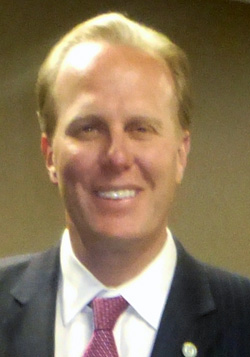
Second in a series
By Donald H. Harrison

SAN DIEGO – Kevin Faulconer, who grew up in Oxnard, was first exposed to San Diego’s Jewish community while a student at San Diego State University, where he met other students involved with Hillel. Evidently, the interactions were positive. Today he is a supporter, at another campus, of Hillel’s long-stalled application to build a student center across the street from UCSD.
Some La Jolla community groups have opposed Hillel, citing traffic and parking concerns, but Faulconer said he believes that Hillel has been working hard to deal with the issues raised by opponents.
The councilman who now is running for mayor also told San Diego Jewish World that he is very impressed by Israel as a “start-up nation” and believes high-tech partnerships between this area and Israel should be explored, not only in terms of Israeli companies possibly locating branches in San Diego, but vice versa. He added that many of his colleagues, while serving as elected officials, were able to travel to Israel under Jewish communal offices, and said he would be delighted if someday he could see the country for himself and explore such possibilities.
Faulconer identified Norman Greene and Steve Cushman as two members of the Jewish community with whom he has worked closely on civic projects. Greene had served with him on San Diego’s Park and Recreation Commission in 2004 when that commission designated a patch of land at Liberty Station in the Roseville section of Point Loma as “Louis Rose Point” after the 19th century Jewish entrepreneur for whom both Roseville and Rose Canyon are named.
He said in an interview on Friday, Jan. 17, that he advocated so naming the point “because of what Louis Rose meant to the city – he was a true founding father, an icon for both the Jewish community and for entire San Diego. And I always felt that it was very important for us as San Diegans to insure that we never forget our history and our roots.” Because he lives in Point Loma, on a street only a few blocks from Roseville, he said he thinks of the early settler often.
Cushman was a port commissioner and Faulconer was a member of the City Council when they teamed up to push the North Embarcadero Visionary Plan, evidence of which can be seen today with construction along Harbor Drive in the vicinity of the Cruise Ship Terminal and the Maritime Museum.
“We are opening up our city’s waterfront by tearing up that asphalt and concrete parking lot and creating a world-class, vibrant, pedestrian-friendly, tree-landscaped promenade,” he said. “We are tearing up all those parking spots by the water because the waterfront should belong to people, not cars.”
He added that after he was elected to the City Council in 2005, he promised to “reinvigorate” the waterfront and “Steve Cushman was my partner in that effort . He was on the Board of Port Commissioners, so with his leadership on the port and my efforts in the city, we were able to jump start that project and now it is becoming a reality. You can see the trees that are being planted and the new pedestrian promenade where we really are making a statement for fugure generations.
“This is a signature project and I am a believer that the waterfront belongs to everyone. It is the city’s front porch. It is something I am really proud of.”
On Thursday, Faulconer attended a reception in his behalf at WAXIE Sanitary Supply’s corporate headquarters in Kearny Mesa. The company, which was begun after World War II by brothers Harry and Morris Wax and today is run by Morris’s son, Charles Wax, was described by Faulconer as an example of a business owned by a family that cares deeply and gives back to the community. “WAXIE is a San Diego institution, but more so than that, it has great people and a hard working family, and is a great example of a Jewish-American success story,” he said. Today WAXIE operates with over 800 employees in nine states.
*
Harrison is editor of San Diego Jewish World. He may be contacted at donald.harrison@sdjewishworld.com